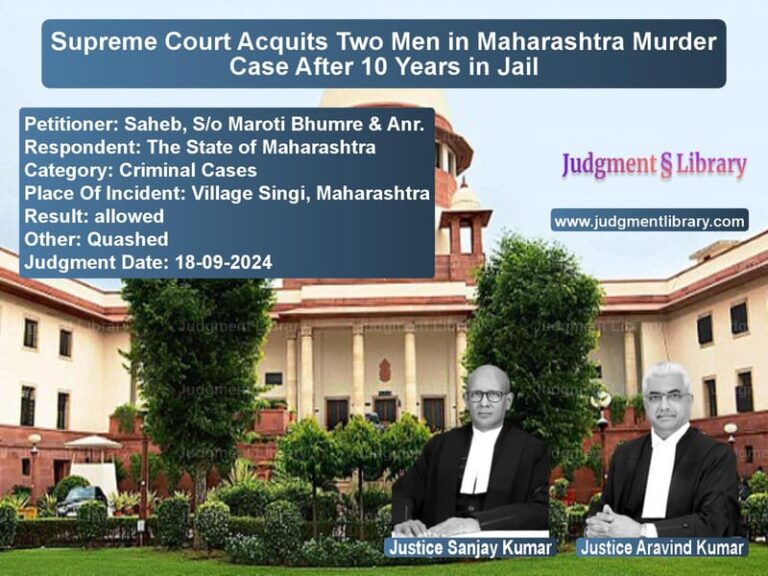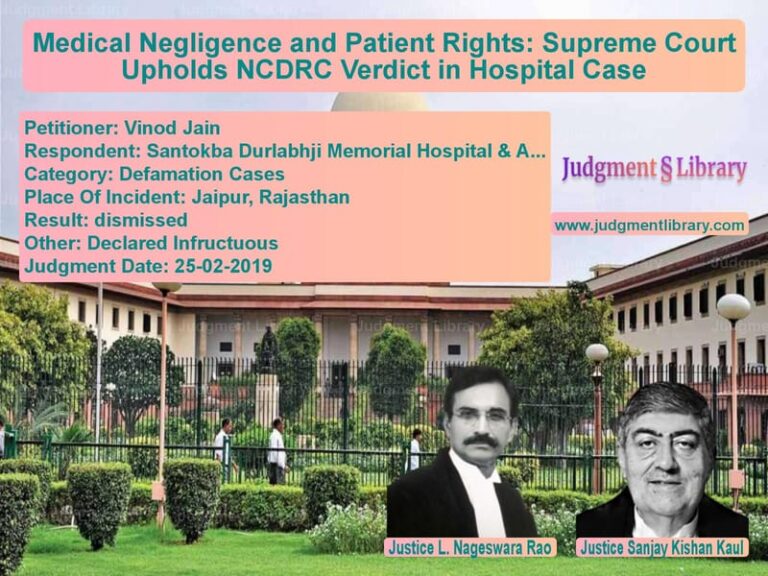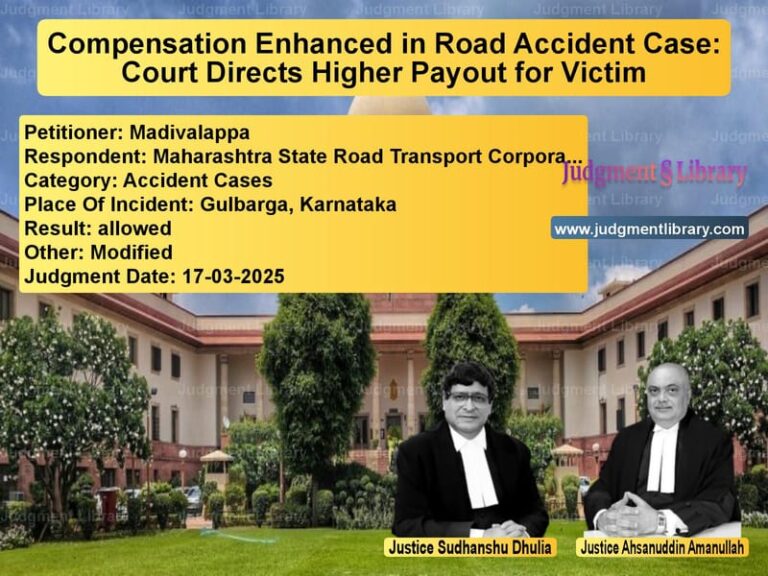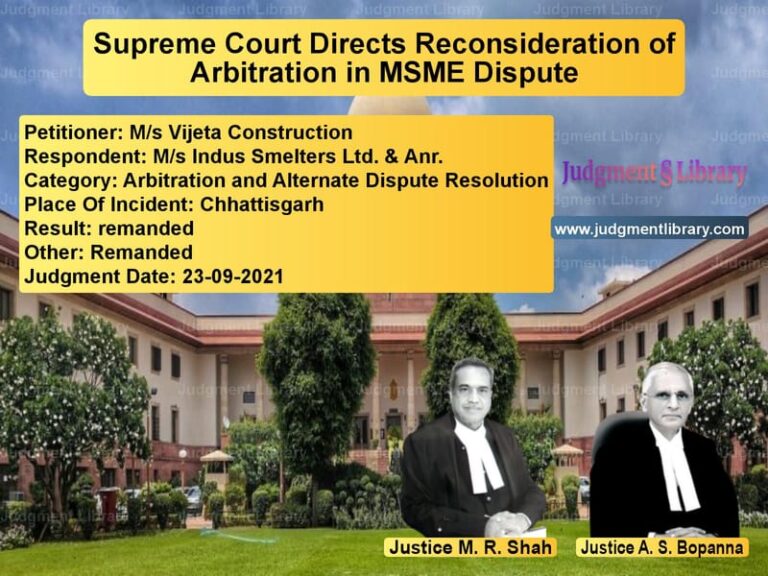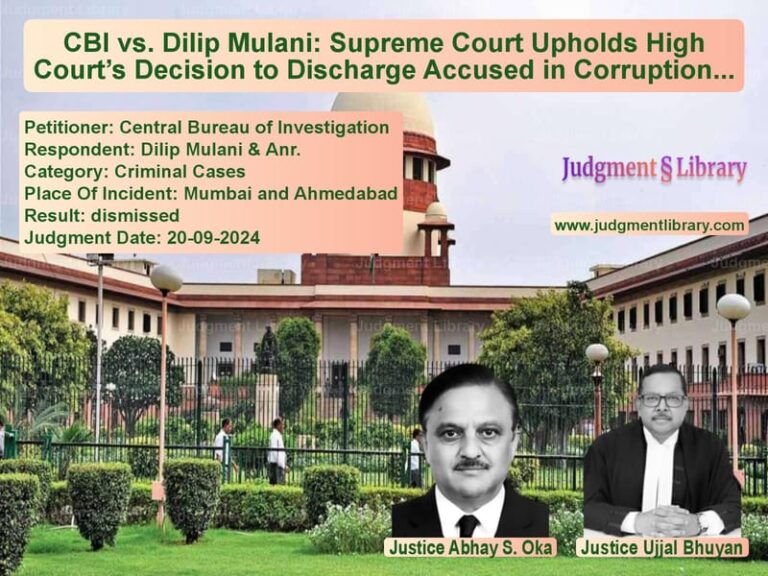Limitation in Insolvency Proceedings: Supreme Court’s Interpretation of Filing and Delay in Appeals
The case between Sanjay Pandurang Kalate and Vistra ITCL (India) Limited brings into focus a significant issue concerning the interpretation of limitation under the Insolvency and Bankruptcy Code (IBC) and the procedural timelines for filing appeals. The appellant, Sanjay Pandurang Kalate, contested the dismissal of his appeal against the National Company Law Tribunal’s (NCLT) order under Section 7 of the IBC. The primary legal question was whether the appeal filed before the National Company Law Appellate Tribunal (NCLAT) was within the prescribed limitation period or whether the delay could be condoned.
The case emerged from the proceedings initiated against Evirant Developers Private Limited, the corporate debtor, by Vistra ITCL under Section 7 of the IBC. The appellant, a former director of the company, had filed an interlocutory application against the initiation of the Corporate Insolvency Resolution Process (CIRP), claiming that the application for CIRP was based on collusion with other respondents. The appellant’s appeal, filed before the NCLAT, was dismissed due to the delay in filing, prompting the present case before the Supreme Court.
Petitioner’s Arguments
The petitioner, Sanjay Pandurang Kalate, put forth several key arguments in his defense:
- The appellant argued that the limitation period should commence from the date the certified copy of the NCLT order was received, which was on 1st June 2023, and not from the date the order was uploaded to the NCLT’s website on 30th May 2023. The appellant claimed that he had no knowledge of the order until the certified copy was received.
- The appellant sought to exclude the period during which the NCLAT was closed for summer vacations from June 5, 2023, to July 2, 2023, from the calculation of the limitation period.
- The appellant further argued that the NCLAT’s rejection of the request for condonation of delay was unjustified, as the delay was due to factors beyond his control, specifically the time taken to obtain the certified copy and the summer vacation closure of the NCLAT.
Respondent’s Arguments
The respondents, Vistra ITCL (India) Limited and others, presented the following arguments:
- The respondents emphasized that the limitation period for filing an appeal under Section 61 of the IBC begins on the date the order is pronounced by the NCLT, not from the date the certified copy is received or the order is uploaded on the NCLT’s website.
- They cited the decision in V Nagarajan v. SKS Ispat where the Court had already clarified that the limitation period commences from the date of pronouncement, and the uploading of the order does not alter this.
- The respondents further argued that the appellant’s failure to act promptly and his reliance on the uploading of the order on the NCLT website, instead of pursuing a certified copy in a timely manner, constituted negligence and led to the delay in filing the appeal.
Supreme Court’s Observations
The Supreme Court reviewed the case in detail, focusing on the issue of limitation and the procedural timelines for filing an appeal under Section 61 of the IBC. The Court made the following key observations:
- The Court emphasized that the limitation period for filing an appeal under the IBC begins from the date the order is pronounced, as per Section 61(2) of the IBC. The date of uploading the order on the website or the date of receiving a certified copy does not affect the commencement of the limitation period.
- The Court noted that while the limitation period is strictly enforced, the appellant’s request for condonation of delay was a matter of discretion for the NCLAT, which had the authority to consider the reasons for the delay. The NCLAT had already exercised its discretion to reject the condonation of delay, and the Court upheld this decision.
- In its analysis, the Court referred to the precedent set in V Nagarajan v. SKS Ispat, which clarified that the limitation period for appeals under the IBC starts from the date of pronouncement of the order, not from the date of uploading or receipt of the certified copy.
- The Court also noted that the NCLAT had issued a notification allowing e-filing during the summer vacations, which meant that the appellant’s request to exclude the period of vacation from the limitation calculation was not justified.
Final Judgment
The Supreme Court ruled as follows:
- The appeal was dismissed as barred by limitation because the appellant had not filed the appeal within the prescribed 45-day period. The Court held that the limitation period began on 17th May 2023, the date of pronouncement of the order, and not from the date the certified copy was received or the order was uploaded to the website.
- The Court reiterated that the NCLAT had correctly rejected the appellant’s request for condonation of delay and upheld the NCLAT’s dismissal of the appeal.
- The Court also emphasized the importance of adhering to the timelines prescribed under the IBC, as delays in insolvency proceedings can have significant implications for the economic health of the nation. The Court expressed its concern about the delays and the need for efficient legal processes in insolvency matters.
Conclusion
The Supreme Court’s ruling in this case provides much-needed clarity on the issue of limitation for filing an appeal under the IBC. The judgment reinforces the principle that the limitation period starts from the date the order is pronounced, and not from the date the order is uploaded or the certified copy is received. The Court’s decision to uphold the NCLAT’s dismissal of the appeal due to the delay highlights the importance of following procedural timelines and ensuring that appeals are filed within the prescribed period. This decision will serve as a critical reference for future cases involving time-sensitive legal processes under the IBC.
Petitioner Name: Sanjay Pandurang Kalate.Respondent Name: Vistra ITCL (India) Limited.Judgment By: Justice Dhananjaya Y Chandrachud, Justice J B Pardiwala, Justice Manoj Misra.Place Of Incident: New Delhi, India.Judgment Date: 03-12-2023.
Don’t miss out on the full details! Download the complete judgment in PDF format below and gain valuable insights instantly!
Download Judgment: sanjay-pandurang-kal-vs-vistra-itcl-(india)-supreme-court-of-india-judgment-dated-03-12-2023.pdf
Directly Download Judgment: Directly download this Judgment
See all petitions in Income Tax Disputes
See all petitions in Banking Regulations
See all petitions in Tax Evasion Cases
See all petitions in Customs and Excise
See all petitions in Judgment by Dhananjaya Y Chandrachud
See all petitions in Judgment by J.B. Pardiwala
See all petitions in Judgment by Manoj Misra
See all petitions in dismissed
See all petitions in supreme court of India judgments December 2023
See all petitions in 2023 judgments
See all posts in Taxation and Financial Cases Category
See all allowed petitions in Taxation and Financial Cases Category
See all Dismissed petitions in Taxation and Financial Cases Category
See all partially allowed petitions in Taxation and Financial Cases Category



